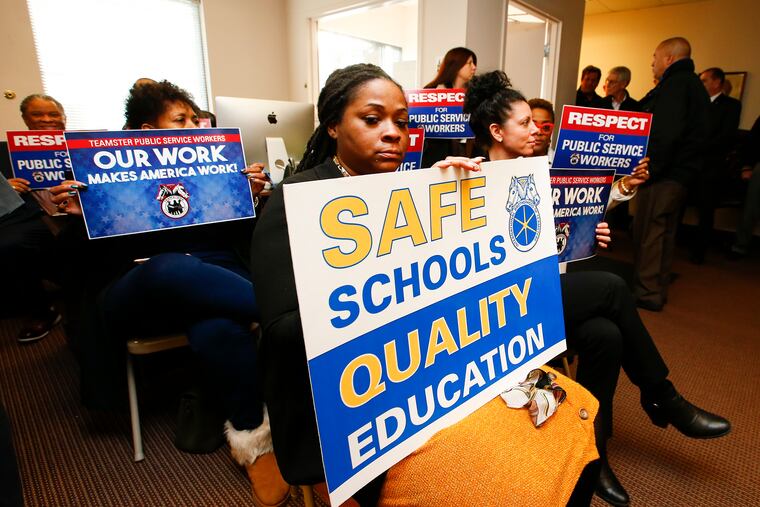Penn, Jefferson, and Drexel should pay their fair share of property taxes
Divestment from Philadelphia’s public school system negatively impacts the health of students, teachers, and staff.

Philadelphia’s universities provide some of the best educational opportunities in the world, yet they coexist in a city with underresourced public schools. The School District of Philadelphia is in a dire public health and budget crisis while the University of Pennsylvania, Thomas Jefferson University, and Drexel University build on their existing enterprises.
In order to remedy this inequity, incoming Superintendent Tony B. Watlington Sr. must make identifying sources of sustained funding his highest priority. City officials should compel universities, hospitals, and other nonprofits to make PILOTs, or payments in lieu of taxes.
These problems are not new. Philadelphia bore the brunt of Gov. Tom Corbett’s school funding cuts in 2013, leaving students and staff to deal with increasingly hazardous school conditions. In May 2018, The Inquirer reviewed five years of internal maintenance logs and building records and found that school staff members had identified more than 9,000 environmental problems, including mold, asbestos, and classrooms with flaking and peeling lead paint.
The consequences of these toxic conditions are already felt. Asthma prevalence in school-age children in Philadelphia is double the national average, teachers in Philadelphia have been diagnosed with mesothelioma, and lead exposure threatens students’ cognitive development. The School District’s new Facilities Planning Process is a step toward addressing these problems, but it still falls short.
In the face of increasing urban inequality as well as the massive land development and financial growth of universities, wealth redistribution is a much-needed first step to addressing our unsafe school conditions. Around 17% of Philadelphia’s total real estate value is owned by nonprofits and thus not taxed. Meanwhile, over 23% of Philadelphians live in poverty and suffer from the most brutal consequences of inequality, such as a crumbling public education system.
While PILOTs are voluntary, the superintendent and others are empowered to make an appeal to these institutions to ask them to voluntarily contribute. The practice of nonprofits making PILOTs to their municipal governments is not a new one. During Mayor Ed Rendell’s administration in the 1990s, Philadelphia nonprofits paid PILOTs to the city annually. Boston’s major institutions make PILOTs contributions to the city in the millions of dollars.
As the wealthiest private institution in Philadelphia, the University of Pennsylvania should be well-positioned to contribute to the School District. Amid the breakneck speed and massive scale of its property development, Penn has grown its endowment by over $5 billion over the course of the pandemic. M. Elizabeth Magill started her term as the university’s president in July, making this a critical moment to demand Penn pay its fair share.
“Under new leadership, there is potential for change.”
Jefferson University is also in the middle of turnover amid massive growth. Jefferson recently expanded its enterprise through a series of purchases, such as acquiring Einstein Healthcare Network and Health Partners Plans Inc., and through new construction. Jefferson has persisted in its development of buildings despite COVID-related financial setbacks. It announced plans in September 2020 to build its $762 million Specialty Care Pavilion, which is currently under construction. In addition, Jefferson opened the $184 million Silvestri Tower last September and plans to build a 12-story research building, projected to cost between $300 million and $350 million. The university also finds itself at a crucial juncture as it searches for a new school president. Under new leadership, there is potential for change.
Drexel University also benefits disproportionately from the city’s property tax exemptions. Huge real estate developments such as the ongoing Schuylkill Yards Project drive up the cost of housing in West Philadelphia, further leading to the displacement of long-term residents. Meanwhile, Drexel reaps the rewards of not paying its fair share of property taxes. While Drexel “gives back” to the local community by engaging in select services, such as the Dornsife Center for Neighborhood Partnerships, the university falls short of addressing the systemic conditions of inequity that push residents to need nonprofit services in the first place. It’s time for Drexel to cede the privilege it wields through its tax-exempt status and invest in the futures of our school communities.
» READ MORE: A broken education system requires more than one-off investments from billion-dollar institutions | Opinion
The School District of Philadelphia needs long-term, sustainable funding to ensure that students and staff are supported, and to decrease the prevalence of health disparities caused by chronic underfunding. Schools in Philadelphia deserve justice through the removal of barriers to work and learning, not merely equity through community services typically given by wealthy nonprofits like Penn, Jefferson, and Drexel.
Building relationships with the new university presidents and supporting progressive campaigns that call for wealth redistribution, like PILOTs, can provide the funding needed to enable the removal of harmful environmental toxins in schools, and serve as excellent first steps in working toward a vision of justice that prioritizes the safety of students, teachers, and staff.
Akira Rodriguez is an assistant professor at the University of Pennsylvania. Liam Rose Martin is an alumnus of Thomas Jefferson University.